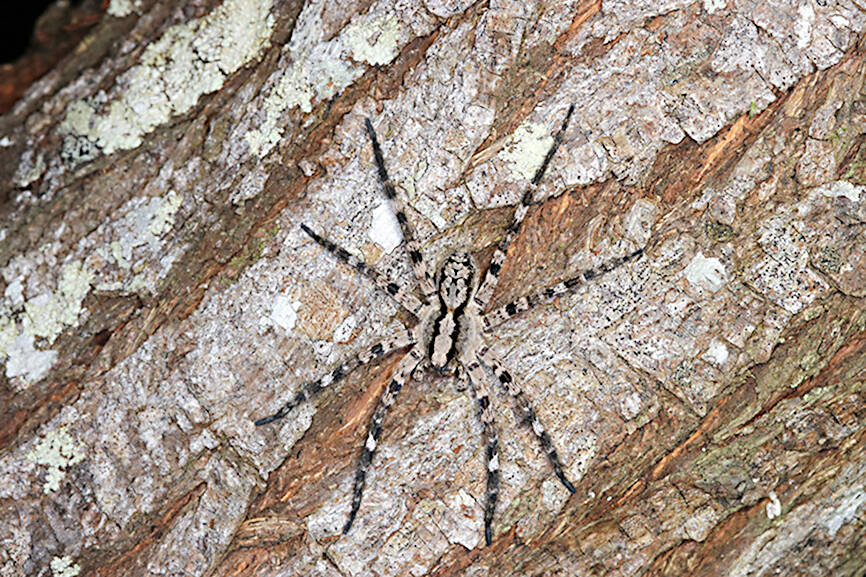Two types of spiders found in southern Taiwan’s Hengchun Peninsula have been identified as new species after years of analysis and cross-checking, the Taiwan Biodiversity Research Institute said on Thursday.
The new species are Idioctis parilarilao, also known as the parilarilao trapdoor spider, and Hogna arborea, or the Taiwanese tree-dwelling wolf spider, the institute said in a statement.
The discoveries came after years of effort by a research team consisting of personnel from the institute, National Taiwan Normal University, National Chung Hsing University and international experts, the institute said.

Photo courtesy of Lo Ying-yuan via CNA
It did not specify when the spiders were first found, but said it took years of collecting specimens, reviewing published studies and DNA time series analyses, and comparing foreign samples to confirm the Parilarilao trapdoor spiders as a new species.
Ultimately, researchers determined that parilarilao trapdoor spiders belong to the family Barychelidae, and that Taiwan is the northernmost habitat of spiders in this family.
Parilarilao trapdoor spiders build nests with trap doors and live in intertidal zones, meaning they are underwater at high tide but exposed during low tide, the institute said.
Their nests are closed by watertight trap doors to ensure that there is enough air and their homes are not flooded or washed away at high tide, and the spiders slightly open the trap doors at low tide and attack prey that go past their nests.
The new species was named after the indigenous name for the area, with parilarilao meaning “living at the end of Taiwan” in the Paiwan language, the institute said.
The other species, Hogna arborea, was determined to belong to the family Lycosidae, and according to the institute, wolf spiders in this family often dwell in grasslands, farmland or meadows.
Researchers found wolf spiders living in treeholes in recent years in several areas of eastern and southern Taiwan, including Hengchun in the south and Yilan and Hualien counties in the east, and that these spiders were later confirmed to be a new species, the institute said.
The new species was named Hogna arborea, with hogna meaning “wolf spider” and arborea meaning “living on trees,” the institute said.
According to the institute, Taiwanese tree-dwelling wolf spiders have a body size of more than 2cm and are considered large compared with most Taiwanese wolf spiders.
Taiwan has more than 20 wolf spider species, the institute said.

POSITIVE DEVELOPMENT: Japan and the US are expected to hold in-depth discussions on Taiwan-related issues during the meeting next month, Japanese sources said The holding of a Japan-US leaders’ meeting ahead of US President Donald Trump’s visit to China is positive news for Taiwan, former Japan-Taiwan Exchange Association representative Hiroyasu Izumi said yesterday. After the Liberal Democratic Party’s landslide victory in Japan’s House of Representatives election, Japanese Prime Minister Sanae Takaichi is scheduled to visit the US next month, where she is to meet with Trump ahead of the US president’s planned visit to China from March 31 to April 2 for a meeting with Chinese President Xi Jinping (習近平). Japan and the US are expected to hold in-depth discussions on Taiwan-related issues during the

‘LIKE-MINDED PARTNER’: Tako van Popta said it would be inappropriate to delay signing the deal with Taiwan because of China, adding he would promote the issue Canadian senators have stressed Taiwan’s importance for international trade and expressed enthusiasm for ensuring the Taiwan-Canada trade cooperation framework agreement is implemented this year. Representative to Canada Harry Tseng (曾厚仁) in an interview with the Central News Agency (CNA) said he was increasingly uneasy about Ottawa’s delays in signing the agreement, especially as Ottawa has warmed toward Beijing. There are “no negotiations left. Not only [is it] initialed, we have three versions of the text ready: English, French and Mandarin,” Tseng said. “That tells you how close we are to the final signature.” Tseng said that he hoped Canadian Prime Minister Mark Carney

President William Lai (賴清德) yesterday bestowed one of Taiwan’s highest honors on Saint Vincent and the Grenadines (SVG) Ambassador Andrea Clare Bowman in recognition of her contributions to bilateral ties. “By conferring the Order of Brilliant Star with Grand Cordon on Ambassador Bowman today, I want to sincerely thank her, on behalf of the Taiwanese people, for her outstanding contribution to deepening diplomatic ties between Taiwan and SVG,” Lai said at a ceremony held at the Presidential Office in Taipei. He noted that Bowman became SVG’s first ambassador to Taiwan in 2019 and

A man walks past elementary school artworks at the Taipei Lantern Festival in Ximen District yesterday, the first day of the event. The festival is to run from 5pm to 10pm through March 15.